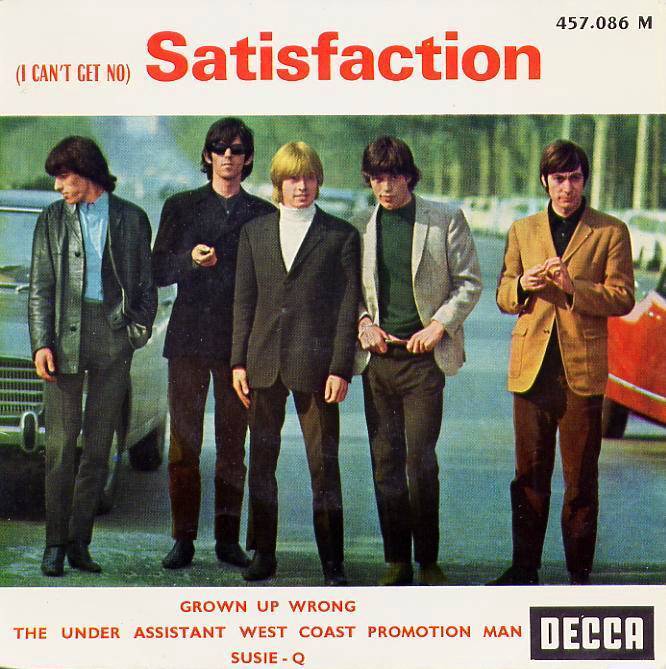July 10, 1965
- STAYED AT #1:4 Weeks
In The Number Ones, I'm reviewing every single #1 single in the history of the Billboard Hot 100, starting with the chart's beginning, in 1958, and working my way up into the present.
It was supposed to be horns. The sound that plays in your head when you think of the words "Rolling Stones," maybe the single most iconic guitar riff of all time, was not supposed to be a guitar riff.
Keith Richards literally wrote that riff in his sleep. He slept next to a guitar and a tape recorder. When he woke up one morning, he saw that a whole side of a tape had been recorded. He rewound it and played it back, and then he heard that riff and a whole lot of snoring.
But after he wrote that riff, Richards, who was obsessed with jumped-up electric Chicago blues, thought it would work better on horns than guitar. Playing that riff, he'd used the first version of the Gibson Fuzz Box, and he loved the distorted sound. But he was mostly using it because he wanted to give the horn players an idea of how the riff should sound. The rest of the band had to convince him to leave it the way it was.
The Rolling Stones were on tour in America when Richards and Mick Jagger got together to write "Satisfaction." They weren't catching on -- at least, not on the level of their British Invasion peers. They'd already released three albums and been to America twice. They'd hit #1 a few times in the UK. But in America, they weren't even competing with Herman's Hermits yet.
Manager Andrew Loog Oldham had given Jagger and Richards strict orders to write songs. When the Stones got together a few years earlier, they mostly just wanted to cover songs from aging American bluesmen. (Jagger and Richards had to fight the rest of the band to include Chuck Berry and Bo Diddley in the repertoire.) But Oldham knew they'd make better money if they weren't giving away songwriting royalties, so Jagger and Richards, who would've probably been happy playing old blues songs forever, had to figure out how to become songwriters. By the time they made "Satisfaction," they were just starting to get confident. "The Last Time," a song they'd written, had gotten to #1 in the UK and made the top 10 in America. But one of the great things about "Satisfaction" is how shaggy and unkempt it is. It's not the work of professional songwriters. It's the work of people who are just starting to understand that they can make their own kind of noise.
Almost from jump, the Stones had been positioning themselves as the rowdier, more dangerous alternative to the Beatles. And in "Satisfaction," you can hear just how well that was working. "Satisfaction" is a song about not getting laid, and it's so furious and petty in its gripes that it stings that much harder. Mick Jagger, after all, comes off as the type of motherfucker who'd start throwing tantrums if he'd only gotten laid twice that weekend. And "Satisfaction" sounds like one of those tantrums.
In the years since "Satisfaction," there's been lots of speculation about Jagger's lyrics and the influence they might've had. Jagger, after all, bitches caustically about the ads he's seeing on TV and hearing on the radio. Writers have speculated that this is an early indication of a generation rejecting the received wisdom of its parents. Maybe that's true. It's certainly the first huge pop single to make artistic use of the bullshit detector. But I hear Jagger being so mad about not getting laid that all the little details of his life -- the ads that might normally play as white noise -- become irritants. He's in one of those everything-sucks moods.
Today, "Satisfaction" is a song that's hard to properly hear, since we've all heard it so many times. It's not a song I ever seek out, and it's definitely not my favorite Rolling Stones song. It's not even my favorite song on the album where it appears. (After all, Out Of Our Heads has both "The Last Time" and "Play With Fire.") But if you force yourself to hear it with fresh ears, there are all kinds of tiny details that go way beyond that riff and the hey-hey-heys. There's Brian Jones' muted, propulsive acoustic guitar. There's that irregular little tambourine shiver. There are the funky cross-currents that Richards lets in as the song keeps going. It's a gorgeously sloppy monster of a song.
In its murky intensity, "Satisfaction" signaled the arrival of a whole new era. In its overwhelming, greasy swagger, it showed that the rules of pop music were different now. And in its success -- no song had held down the #1 spot for four weeks since "Baby Love" nine months earlier -- it showed that there was a whole new band of miscreants in town.
GRADE: 10/10
BONUS BEATS: There are so many different directions I could go here. The song's been covered a million times, and plenty of those covers are iconic. Otis Redding turned it into an anarchic yowl. The Residents transformed it into an ugly noise-lurch. Devo pulled off the incredible prank of stripping away all the sex and danger and making it into a stiff and robotic anti-funk chirp. Britney Spears reimagined it as breathily brickwalled teenpop. Cat Power sang it as a mournful and elemental dirge. I could've put any of them into this spot. Instead, I'm going with the cover I love the best. So here's the stunningly stripped-back version that PJ Harvey and Björk performed as a duet at the 1994 Brit Awards:






